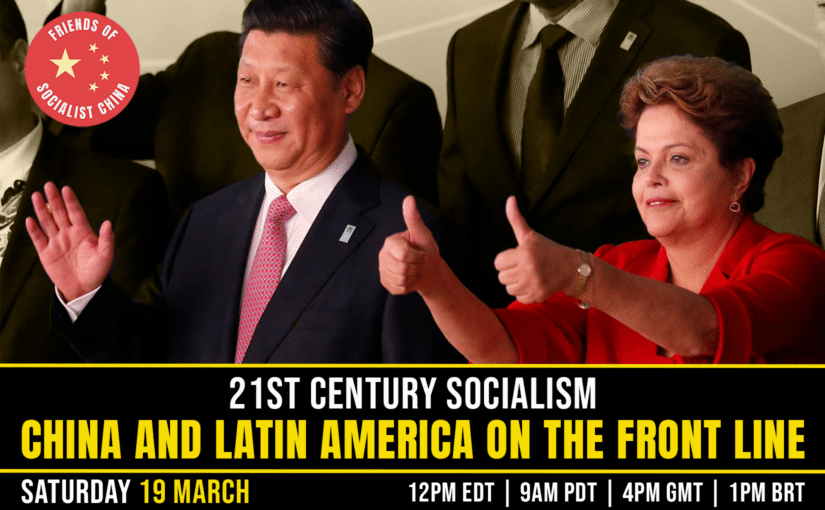
The Friends of Socialist China sponsored on March 19, 2022, a Webinar on “21st Century Socialism: China and Latin America on the Frontline.” Friends of Socialist China, located in London, is a platform dedicated to supporting the People’s Republic of China and promoting understanding of Chinese socialism. The event was co-sponsored by lborada, ANTICONQUISTA, CODEPINK, Geopolitical Economy Research Group, International Action Center, International Manifesto Group, Kawsachun News, Morning Star, Multipolarista, and Simón Bolívar Institute for Peace and Solidarity Among Peoples.
The event was moderated by Radhika Desai, Director of the Geopolitical Economy Research Group (University of Manitoba, Winnipeg Canada), and Convener of the International Manifesto Group. She observed that the relation between China and Latin America is of growing importance, and it is central to a world-wide shift from decadent capitalism to modern and progressive socialism, from a US-centered world to a China-centered world. As an indication of this shift, U.S. trade with Latin America has decreased significantly, while Chinese trade and investment in Latin America has greatly increased. China is now the top trading partner of Brazil, Uruguay, and Peru; and it is the second trading partner of several Latin American nations.
The events of recent weeks have given a boost to the Chinese-Latin American relation, as it has become increasingly clear that the United States demands the subordination of the nations with which it has relations, including its supposed allied and friends.
The first speaker was Carlos Martinez, an author and researcher based in the UK, and Co-editor of the Friends of Socialist China. We focus on China, he began, because China is the largest socialist and the largest developing country, and it has had great economic gains in recent decades. You cannot discuss socialism without discussing China, which recently has entered a phase of common prosperity, the reduction of inequalities, and sustainable development, while its GDP it approaches that of the developed countries.
At the same time, Latin America has much to say concerning the construction of socialism. First, there was the triumph of the Cuban Revolution in 1959, which was followed by a U.S. reactionary wave of repression in Latin America. But Hugo Chávez found a discourse announcing socialism for the twenty-first century, which included a vision for a “pluripolar” world, on a basis of socialist China advancing, Russia recovering from the setbacks of the 1990s, Iran finding an internationalist anti-imperialist road, and the renewal of currents of the Left in Latin America. Venezuela and Cuba were soon joined by Bolivia, Ecuador, and a revitalized Sandinista revolution in Nicaragua in announcing a road of the construction of socialism for the twenty-first century.
RELATED CONTENT: China Plays a Crucial Role Supporting Progress and Sovereignty in Latin America
Today, Martinez declared, the progressive governments of Latin America stand with China and Russia.
Dilma Rousseff, the former President of Brail, was the keynote speaker. Dilma, as she is affectionately known, was twice elected president of Brazil as candidate of the Worker’s Party, serving as President from 2011 to 2016, when she was illegally removed from office by a judiciary coup. During her presidential administrations, she deepened and expanded the progressive reforms of her predecessor and Workers’ Party comrade, Luis Inácio Lula da Silva, known as Lula.
Dilma gave an impressive presentation, in which she demonstrated a well-informed and knowledgeable understanding and a capacity for clear and succinct expression.
Dilma maintained that Brazil always has had a position of absolute independence in foreign relations, which was expressed in Brazil’s relations with the BRIC countries. This commitment to sovereignty leads to in friction with the powerful countries, which has been growing since the financial crisis of 2008. Tension was strong under Obama but was much greater under Trump.
In global economic competition, the balance is increasingly favoring China. China’s strength was especially evident with respect to the COVID, in which there was a tremendous contrast between China and the United States in containing the coronavirus. In addition, China has connected to the international community, offering support in combatting COVID. This has increased China’s soft power, which also is enhanced by China’s neutral position with respect to the crisis in Ukraine.
Dilma noted that the size of China’s economy, as measured by GDP, will surpass that of the United States by 2030. Whereas the U.S. economy is undermining itself by deindustrialization and financial speculation, China is leading the fourth industrial revolution, which has enabled it to lift many people out of absolute poverty. The growth of the Chinese economy is seen in the fact that more than 100 countries trade more with China than they do with the USA. At the same time, there is a great complementarity between China and Latin America, so that the U.S. hope of “decoupling” Latin America from China faces formidable obstacles.
The USA remains a point of reference in science, due to its research. But U.S. investments in science have been declining since the 1980s. In China, science is given a high priority, and science is central to its socialist modernization. The number of scientists and engineers in China is six times that of the United States, and it surpasses that of the UK, Europe, and Russia combined. Its strength in the fourth industrial revolution sectors of artificial intelligence, big data, and ICT will lead to an increase in other economic activities. Whoever is in the vanguard of 5G technology will have a great advantage in economic productivity, and China is in an advantaged position to take the lead. In addition, China has a process of long-term investment, so that it will likely maintain its advantage in the long term.
Dilma observed that in contrast to capitalism, in which there is growing inequality, China approaches economic expansion with an emphasis on equity. The historic emphasis of the Chinese Revolution on equality has received renewed support in recent years, with an ideological shift to common and shared prosperity.
China’s development paradigm is both internal and external; it is based on the development of the domestic economy in conjunction with the development of mutually beneficial trade with other nations. Its international trade is based in a concept of shared development, which is very important for Latin America; a concept that contrasts with neoliberalism, which kills capitalism itself, by financing the wealth of those at the top and by promoting deindustrialization. China is offering a form of development that Latin America needs.
China attaches importance to the role of the state. The market has a role in stimulating productivity, but the state acts to correct negative consequences of advances in productivity, such as inequality.
Dilma maintained that Latin America must leave behind an economy based on deindustrialization and develop a new policy of reindustrialization. We can no longer accept, she says, a geographical division of labor in which we import advanced technology products, leaving us in the periphery. We cannot remain on the level of exporting raw materials. We must develop a high level of industrialization, integrating our economy into the fourth industrial revolution. Participation in the Chinese Belt and Road Initiative will open possibilities, standing in contrast to the U.S. expectation that the Latin American countries will not use 5G technologies. We must leave behind the Monroe Doctrine, which means Latin America for the North Americans. We must cast aside the inferiority complex of Latin American elites, who cannot not see beyond dependency on the USA.
Developing countries, Dilma notes, are underrepresented in the International Monetary Fund and the World Bank. BRICS is an effort to correct this imbalance, and it has led to greater voice in the World Trade Organization and the World Health Organization. Trump’s policy was to distance the United States from international organizations. Biden tries to reverse this erroneous policy, but he will not be able to completely correct course.
Developing countries are expected to embrace a market economy and liberal democracy. This policy does not recognize the alternative structures being developed in China, and in this regard, we should be aware, Dilma observes, that the Communist Party of China is nothing like the Communist Party of the Soviet Union, which fell into bureaucratism and distancing itself from the people.
Observing the economic growth of China and recognizing that an all-out war with China would mean devastation, the United States adopted a policy of the containment of China. However, the strategy of NATO territorial expansionism only served to intensify the relation between China and Russia. U.S. sanctions, which began with the Russian reincorporation of the Crimean peninsula into its territory, have strengthened Chinese-Russian ties.
The United States uses the dollar as a weapon, Dilma maintians. It applies sanctions against companies of third countries that trade in dollars with Cuba, Venezuela, and Iran. Dollar hegemony was designed to facilitate the flow of currency, and even a large economy like China’s economy today cannot avoid trading in dollars. But the dollar is now weaponized. In response, China has been developing an alternative to SWIFT. The conflict in Ukraine may accelerate its implementation: the alternative to SWIFT may be implemented in three to five years, in contrast to previous projections ten to fifteen years. In addition, China has been developing digital currencies, which have been accepted by Russia and Saudi Arabia for the payment of oil.
Dilma concluded with the observation that China is an international point of reference in the field of socialism, a real socialism on the road toward modern socialism. Latin America must seek joint development in cooperation with China.
Jiang Shixue is Director at the Center for Latin American Studies at Shanghai University and researcher at the Chinese Academy of Social Sciences. He expressed the high respect that all Chinese scholars have for Dilma and their hope for the victory of the Workers’ Party of Brazil in the presidential elections.
Jiang declared that China wishes to develop relations with Latin America and other developing countries. He observed that Chinese-Latin American relations do not fit into the center-peripheral structure identified by Prebisch and dependency theory, in which the periphery depends on the center for capital and technology. China is a developing country. China’s relations with Latin America pertain to the structure of South-South cooperation, and they are based on mutual respect.
China does not consider ideological differences to be a barrier to economic relations. It is true Jiang states, that we are on the road to socialism under the leadership of the Communist Party, but we do not take ideology into account in developing economic relations. In fact, the Communist Party of China has relations with political parties of many ideologies.
China has invested in Latin America and has contributed to Latin American economic development. But the trade with Latin America helps China as well, providing markets and natural resources for China.
Jiang maintains that future relations between China and Latin America would be strengthened by developing better understanding. Differences in political-economic systems, culture, and language as well as geographical distance are obstacles to mutual understanding, so attention to the development of greater understanding is needed, through activities of media and academic exchanges, tourism, and internet publications. He invited all to apply for Chinese state scholarships to study in China.
Both China and Latin America, Jiang noted, have suffered from unilateralism. Cooperation is needed to promote bilateral relations and genuine multilateralism.
Jiang notes that the United States is concerned with the growing relation between China and Latin America. Former Secretary of State Rex Tillerson argued that the Monroe Doctrine is still valid. And Evan Ellis (research professor of Latin American Studies at the U.S. Army War College Strategic Studies Institute) maintains that Latin American-Chinese relations threaten prosperity and democracy in Latin America and the security of the USA.
But China, Jiang declares, does not wish to challenge traditional U.S. influence in Latin America. China sees Latin American prosperity as good for the United States. In fact, China and the USA ought to cooperate in supporting Latin American development. Cooperation between Latin America and China is good for the world.
Carlos Miguel Pereira, Cuban ambassador to China, maintained that China is at the forefront of analysis and understanding of socialism. It is leading the world in moving toward a new international economic order and a pluripolar world, against U.S. hegemony, and for the benefit of humanity. The rise of China cannot be stopped. No other socialist project has achieved as much as China, which has attained sovereignty and sustainable development, establishing the conditions for overcoming extreme poverty.
China and Cuba have a common vision, Pereira declared. But the truth about China, Cuba, and socialism has been massacred by the media of misinformation. In reality, China is an important element in the equilibrium of the world, inasmuch as it does not impose models or sanctions. The blockade of Cuba has been imposed in order that socialism will not be seen as associated with prosperity and progress.
Latin America continues to be the most unequal region in the world, a phenomenon that exposes the failure of neoliberalism and the International Monetary Fund and World Bank. Latin America must continue to construct its own cultural identity, through movements pushing for change, on a foundation of Marxist principles. China demonstrates, Pereira maintains, the universal truth of Marxism-Leninism.
Ma Hui, China’s ambassador to Cuba, observed that China has developed its own path to socialism, in the context of historic conditions established by the unequal treaties imposed by the Western powers, which reduced China to a semi-colonial state. Socialism with Chinese characteristics is true socialism, and it is the only path to develop China.
Central to Chinese socialism, Ma explains, are the peoples’ congresses, in which the people are the masters. In contrast to the multi-party competition of representative democracy, China has a system of multi-party cooperation under the leadership of the Communist Party, seeking consensus. China has substantive democracy, with both direct and indirect elections. China has a socialist market economy, guided by the state, seeking the common prosperity of all. It is a people-centered approach, in which Marxist ideology plays a guiding role. In recent years, Xi Jinping has led the nation out of poverty and toward moderate prosperity.
The Chinese party and government successfully combatted COVID-19. They put people and lives first, thereby saving human life.
Ma notes that socialism is an evolving process. Marxism guides with principles, not with dogma.
China and Cuba are bound together by common experiences and beliefs. China affirms that Cuba has the right to choose its own political-economic system. The blockade his limited Cuba’s capacity for development; China demands the elimination of the blockade.
Ma concluded with a quotation of Xi, who declared that Cuba has been true to its path, and it therefore has earned the respect of the peoples of the world; and that Cuba is a great country, because it is led by the Communist Party, because it is committed to science, and because of its contributions to socialist internationality.
Camila Escalante is a reporter for Kawsachun News in Bolivia. She maintains that Bolivia today, under the leadership of the socialist government of Luis Arce, sees China as important, especially for the Latin American countries constructing socialism which have a commitment to scientific development and overcoming inequality. Bolivia has re-established diplomatic relations with Nicaragua and China, following their interruption by the de facto government of 2919-2020. The government is now in the process certifying small and collective businesses and farms for the exportation of their products to China, while at the same time, China is developing projects in Bolivia. China is crucial to Latin American trade, because of its large market and economy. For this reason, the United States view relations between Latin America and China as a threat to is interests in its historic “backyard.”
Carlos Ron is President of the Simón Bolívar Institute in Venezuela. He notes that diplomatic relations between Venezuela and China were established in 1974, and the relations became important under the leadership of Chávez and Maduro. Since 2014, Venezuela and China have had a comprehensive strategic alliance.
There has been significant trade between the two countries. China has supported productive and social projects, and it is the second purchaser of Venezuelan petroleum. Trade since 2017, however, has reduced, because the U.S. economic sanctions prevent ships from docking in many ports, complicating deliveries; and because elevated insurance rates have led to escalating costs.
Ron maintains that the relation between China and Latin America is mutually respectful and mutually beneficial. The Chinese-Latin American relation demonstrates that it is possible to develop relations without intervention in the internal affairs of states.
This new reality creates a new situation for the United States. The multipolar world is here; it is no longer emerging, Ron maintains. The new situation has led the United States to provoke confrontation in Ukraine, seeking to rally the support of its allies. We can expect further confrontations to occur, with the USA demanding that you are with us, or you are against us.
A delegation has arrived in Venezuela to explore the possibility of renewing the sale of Venezuelan oil to the United States, in light of the impact of the embargo of Russia on prices in the USA. This trade could be renewed, Ron observes, because Venezuelan never refused to sell to the United States; the trade was stopped by U.S. sanctions. However, in order for trade to be renewed, the U.S. government must eliminate sanctions and trade on a basis of mutual respect. And Venezuela will not trade at the expense of any of its partners, like Cuba and China; Venezuela knows what true cooperation looks like.
Ron stated that we have Bolivarian socialism for the twenty-first century, and we share with China a commitment to a pluripolar world. We are working in the United Nations against unilateral coercive sanctions against nations.
Ron concluded by quoting Chávez: “China and Venezuela will never cease in cooperating for a new world of justice, equality, and peace.”
Ben Norton is a journalist and founder of the platform Multipolarista, based in Nicaragua. He maintained that Latin America is at the center of the New Cold War that the United States is waging against China and Russia. The USA wants to maintain its unilateral hegemony, and it seeks to prevent Latin American integration with China and Russia, which has been developing in fact.
Norton maintains that the USA has shifted its policy away from its “war on terrorism” centered in the Middle East. It is now oriented toward great power competition, in which the great threats are China and Russia at the highest level, especially China; Iran and PDRK (North Korea) on a second tier, followed by Venezuela and Cuba. The USA claims that these countries are threats to its national security. The USA sees these countries as an independent bloc, and the sanctions against Russia are meant to target the others.
The United States wants to break Latin American relations with China and Russia. The USA attempts to bully Latin American countries into reducing ties, but Latin America refuses to go along.
Francisco Domínguez is Secretary of the Venezuela Solidarity Campaign (UK). He observed that neoliberal policies failed in Latin America, giving rise to the emergence of a progressive and leftist governments in the region. When the Right returned to power is some nations, it reinforced the lesson of the failure of neoliberalism.
RELATED CONTENT: Latin America Will Continue to Distance Itself from the United States
Therefore, Dominguez maintains, the only viable option is now clear: a China-centered multipolarity enabling consolidation of the progressive governments of the region. However, the relation between China and Latin America must be win-win, facilitating technology transfer and capital accumulation in Latin America, and thereby enabling Latin American nations to defend their sovereignty.
Conclusion
The panelists on the Webinar on China and Latin America are part of an intellectual current in the world Left, which basis its commitment to socialism in the experiences of the developing countries that are constructing socialism. It is an intellectual current that is reading the signs of the times, and it discerns that the capitalist world-economy is in decadence, unable to resolve the problems that humanity confronts, giving rise to an aggressive imperialism that threatens humanity. And it discerns that an alternative pluripolar world order is taking concrete shape, a Chinese-centered world, with the developing countries constructing socialism (China, Venezuela, Cuba, Bolivia, Nicaragua), the Islamic Republic of Iran, and a revitalized Russia in the vanguard. It discerns a new socialism emerging in practice, a socialism with political structures of people’s democracy that seek consensus, and with state-directed economies designed for the long-term and sustainable common prosperity of all on a foundation of science and technology. It is a formulating a Marxism based on the principles of Marx yet formed in the current world reality, a Marxism written in practice by the colonized. This intellectual current of the world Left calls the peoples of all lands to informed and mature political action.
The following is a detailed report of our recent webinar, 21st Century Socialism: China and Latin America on the Frontline, by US-based political analyst Charles McKelvey.
Featured image: File photo.
- Orinoco Tribune 2https://orinocotribune.com/author/yullma/
- Orinoco Tribune 2https://orinocotribune.com/author/yullma/April 25, 2024
- Orinoco Tribune 2https://orinocotribune.com/author/yullma/April 25, 2024
- Orinoco Tribune 2https://orinocotribune.com/author/yullma/April 25, 2024
Share this:
- Click to share on Twitter (Opens in new window)
- Click to share on Facebook (Opens in new window)
- Click to share on LinkedIn (Opens in new window)
- Click to share on WhatsApp (Opens in new window)
- Click to share on Reddit (Opens in new window)
- Click to share on Telegram (Opens in new window)
- Click to email a link to a friend (Opens in new window)





